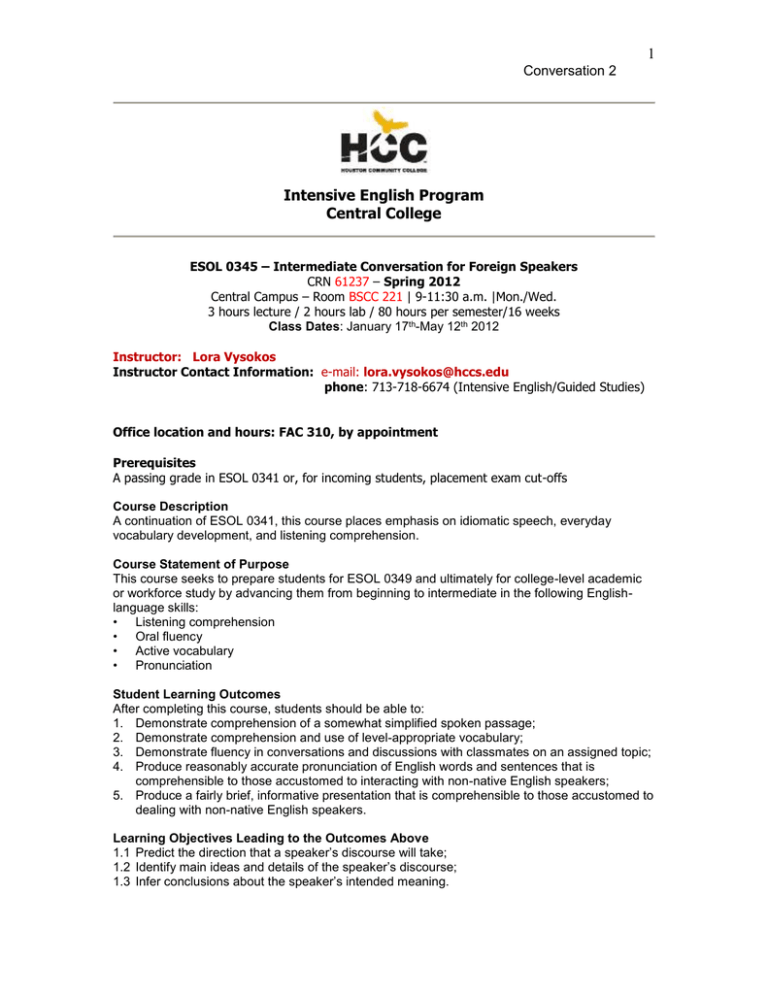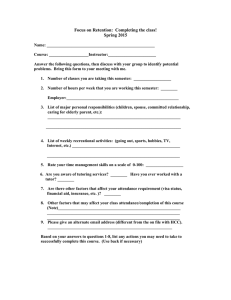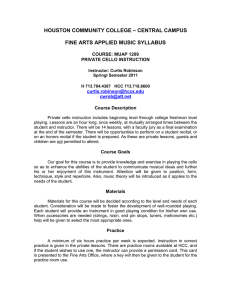
1
Conversation 2
Intensive English Program
Central College
ESOL 0345 – Intermediate Conversation for Foreign Speakers
CRN 61237 – Spring 2012
Central Campus – Room BSCC 221 | 9-11:30 a.m. |Mon./Wed.
3 hours lecture / 2 hours lab / 80 hours per semester/16 weeks
Class Dates: January 17th-May 12th 2012
Instructor: Lora Vysokos
Instructor Contact Information: e-mail: lora.vysokos@hccs.edu
phone: 713-718-6674 (Intensive English/Guided Studies)
Office location and hours: FAC 310, by appointment
Prerequisites
A passing grade in ESOL 0341 or, for incoming students, placement exam cut-offs
Course Description
A continuation of ESOL 0341, this course places emphasis on idiomatic speech, everyday
vocabulary development, and listening comprehension.
Course Statement of Purpose
This course seeks to prepare students for ESOL 0349 and ultimately for college-level academic
or workforce study by advancing them from beginning to intermediate in the following Englishlanguage skills:
• Listening comprehension
• Oral fluency
• Active vocabulary
• Pronunciation
Student Learning Outcomes
After completing this course, students should be able to:
1. Demonstrate comprehension of a somewhat simplified spoken passage;
2. Demonstrate comprehension and use of level-appropriate vocabulary;
3. Demonstrate fluency in conversations and discussions with classmates on an assigned topic;
4. Produce reasonably accurate pronunciation of English words and sentences that is
comprehensible to those accustomed to interacting with non-native English speakers;
5. Produce a fairly brief, informative presentation that is comprehensible to those accustomed to
dealing with non-native English speakers.
Learning Objectives Leading to the Outcomes Above
1.1 Predict the direction that a speaker’s discourse will take;
1.2 Identify main ideas and details of the speaker’s discourse;
1.3 Infer conclusions about the speaker’s intended meaning.
2
Conversation 2
2.1 Understand and use new vocabulary relevant to topics of discussion in class;
2.2 Understand and use American English idioms appropriate to topics of discussion.
3.1 Practice expressing and comprehending a range of ideas and emotions on a given topic for
conversation;
3.2 Determine meaning by seeking clarification from others;
3.3 Differentiate student’s own opinions from those of other students, and analyze these
differences.
4.1 Use appropriate word and sentence stress;
4.2 Produce accurate stress and intonation patterns to distinguish between statements and
questions;
4.3 Use perceptible plural forms in speech;
4.4 Use common contractions and reductions in colloquial speech.
5.1 Produce a presentation of 3-5 minutes on a familiar topic pre-approved by the instructor.
INSTRUCTOR’S REQUIREMENTS
The teacher needs to:
Create a rich environment for learning and student interaction.
Give students extra learning resources in class and in lab on topics connected to the
course
Make classes, projects, tests, assignments, policies, dates, and regulations clear.
Tell students about important HCC policies such as attendance and academic honesty
(no cheating).
Make arrangements to be available to students when they need help or have questions.
Give help when needed
Provide grading scales and assessment.
Make a class calendar available.
To succeed in college the students need to:
Work hard, attend all classes, and be on time. Good attendance + hard work =
SUCCESS
Pay attention, listen carefully and ask questions. Listen and be respectful to other
students’ contributions.
Create a good learning environment. Turn off cell phones or use vibrate mode for
emergencies. No Texting in class.
Concentrate. Use English only in class time and sit next to someone who doesn’t speak
your language.
Eat well for energy. The brain needs good food. Eat breakfast at home and lunch in break
times.
Do homework. The brain learns by seeing new words and ideas many times in different
ways.
Do your own work and learn. Copying from the Internet and other sources is not learning.
Have fun with English. Read, write, listen and speak English in daily life through TV, neighbors,
students and coworkers, and volunteering in the community. Use technology for learning online in
English learning sites.
3
Conversation 2
HCC Grading Scale
90-100% =A
80 – 89% = B
70 – 79% = C
Below 0-69% = IP/ F/FX (not passing)
A = 100- 90:
4 points per semester hour
B = 89 - 80:
3 points per semester hour
C = 79 - 70:
2 points per semester hour
F=Below 70
1 point per semester hour
59 and below
0 points per semester hour
IP (In Progress)
0 points per semester hour
W(Withdrawn)
0 points per semester hour
I (Incomplete)
0 points per semester hour
AUD (Audit)
0 points per semester hour
IP (In Progress) is given only in certain developmental courses. The student
must re-enroll to receive credit. COM (Completed) is given in non-credit and
continuing education courses. To compute grade point average (GPA), divide
the total grade points by the total number of semester hours attempted. The
grades "IP," "COM" and "I" do not affect GPA. Note: A students who attempts
the course a second time, but is not successful is given an F. An FX is given if a
student does not withdraw from the course but stops attending class. This will
alert Financial Aid.
ESOL 0345 Grading Formula
Activities and participation
Lab
Listening activities and tests
Oral presentations
Final examination
5%
5%
25%
40%
25%
100%
Student Assignments
Individual Presentations
A paired Presentation
Recordings for fluency, accuracy, and pronunciation
Listening Assignments (in the lab and homework)
Other speaking and listening activities in class
Assessments
Unit quizzes
Presentations
Listening quizzes
Final examination
Instructional Materials
Northstar 3: Focus on Listening and Speaking, 3rd edition, Solorzano & Schmidt
(Pearson Longman Publishers)
4
Conversation 2
Course Calendar
ESOL 0345 Intermediate Conversation for Foreign Speakers
Spring 2012
(This calendar may change to meet the needs of the class.)
Important Dates
Jan. 17th
Classes begin
Jan. 18th
Last day to drop/add/swap; fee may apply ($15.00)
Feb. 30th
Official Day of Record
Feb. 20th
President’s Day-Holiday-No Classes
March 12-18th
Spring Break-No Classes
March 29th
Last Day for Administrative/Student Withdrawals (by 4:30)
April 6-8th
Spring Holiday (Friday-Sunday)
May 6th
Instruction Ends
May 7-13th
Final Exams
May 18th
Grades available
Week 1:
Introduction; orientation; diagnostics
1/18
Advertising on the Air, Sections 1-2
Week 2:
Advertising on the Air, Sections 3-4
1/23 & 25
Pushing the Limit, Sections 1-2
information about Oral Presentation #1 (Note: At least one
presentation must be in PowerPoint)
Week 3: 1/30 & 2/1
Pushing the Limit, Sections 3-4
Week 4:
Too Good to Be True, Sections 1-2
Oral Presentation #1
2/6 & 8
Week 5:
Too Good to Be True, Sections 3-4
2/13 & 15
The Art of Storytelling, Sections 1-2
Information about Oral Presentation #2
Week 6:
The Art of Storytelling, Sections 3-4
2/22 (Wed.)
Week 7: 2/27 & 29
Separated by the Same Language, Sections 1-2
Week 8:
Separated by the Same Language, Sections 3-4
Oral Presentation #2
3/5 & 7
Week 9:
Culture and Commerce, Sections 1-2
3/12 & 22
Information about Oral Presentation #3
Week 10:
Culture and Commerce, Sections 3-4
3/26 & 28
Week 11:
Joking Around, Sections 1-2
Oral Presentation #3
4/2 & 4
Week 12:
Traditional or Trendy, Sections 1-2
4/9 & 11
Week 13:
Traditional or Trendy, Sections 3-4
4/16 & 18
To Spank or Not to Spank, Sections 1-2
Week 14:
To Spank or Not to Spank, Sections 3-4
4/23 & 25
Week 15:
Before You Say I Do, Sections 1-4
4/30 & 5/2
Review for final examination
Week 16: May 7th
FINAL EXAM
5
Conversation 2
PROGRAM AND ESL DISCIPLINE REQUIREMENTS
Basic Requirements for ESOL 0345
Students in ESOL 0345 will have performed the following tasks at an appropriate skill level:
• Before listening to a recorded passage on a topic, demonstrate understanding of vocabulary
and language to be used in the passage.
• After listening to a recorded passage, demonstrate skills of (a) prediction, (b) comprehension
of main ideas, (c) comprehension of details, and (d) inference.
• Discuss everyday topics using grammar, pronunciation, and idiomatic expressions
appropriate to the Intermediate level.
• Make oral presentations including role plays, surveys, speeches, and experiments that
require individual and group preparation.
Instructional Methods (related to Student Learning Outcomes)
1a. classroom discussion;
1b. pair work;
1c. recorded conversations and exercises
2a. classroom discussion;
2b. pair work
3a. Modeling correct English pronunciation;
3b. Playing for students sample passages of spoken English to imitate;
4a. Lecture (describing the elements of a successful presentation)
4b. Group work (for selecting topics and peer critique of topics)
HCC Policy Statement: Academic Honesty (Dishonesty = Cheating)
Any form of cheating or copying will result in a grade of 0 for that assignment and possibly
recommendation for probation or dismissal from the college system. Cheating includes copying
from another student during a test or giving another student answers on a test. Another form of
cheating (called plagiarism) is copying from the Internet or another text and presenting it as your
work. An additional form of cheating is memorizing text from the Internet or a book and presenting
those words as your own on a test or in homework. ALL work has to be written by the student and
not copied from another source.
HCC Policy Statement: Attendance
According to the HCC Student Handbook, you may be dropped from a course after accumulating
absences in excess of 12.5 percent of the total hours of instruction (lecture and lab). For Intensive
English if you exceed a total of 10 hours (12.5%) of absence in any class (4 days of any class,
including labs), you can be dropped from all Intensive English classes. This will make F1
students out of status and cause visa problems. Please email me if you are absent and talk to me
on your return to find out the work that you missed.
Tardiness and in-class time absence
Classes and tests begin on time. Lateness of ten minutes or more counts as class or lab
absence. Three tardies (lateness) = 1 absence. Lateness after break times, leaving early or
disappearing during class or lab are also counted as absences. Texting, using social networking
sites, or other improper use of technology during class time or lab time are also counted towards
your absences (1 warning = 1 tardy).
Class attendance leads to class success.
HCC Withdrawal Deadline
To drop a class, you must speak with a counselor or an advisor. The nearest place to see one is
in the Learning Hub. Students who have excessive absences after the withdrawal date will
receive an FX. Note: International students will be out of status if they drop or are dropped
from their classes and may have to return to their countries. Speak with a counselor or an
6
Conversation 2
advisor before dropping classes to make sure you understand the procedures.
HCC Policy on Students Repeating a Course for the Third Time
Repeating students:
Grades of IP or F are failing grades; the student will have to repeat the course. A student who
fails a class for the second time must receive a grade of F for that class. Students who repeat a
course for three or more times will have to pay a higher tuition fee at HCC and other Texas public
colleges and universities. If you are having trouble in class, talk to your teacher and get help from
a tutor. Get other assistance from a counselor before withdrawing or for advice if your grades are
not passing. Students should get help so that they will not fail.
HCC Policy Statement – ADA
Any student with a documented disability (e.g. physical, learning, psychiatric, vision, hearing, etc.)
who needs to arrange reasonable accommodations must contact the Ability Services Office in
Room 102 Learning Hub, or call (713) 718-6164 to make necessary arrangements at the
beginning of each semester. Your instructor is authorized to provide only the accommodations
requested by the office of Ability Support Services.
HCC Policy on Sexual Harassment
Sexual harassment in any form is not tolerated at Houston Community College. It is a violation of
HCCS policy for an employee, agent, or student of the college to engage in sexual harassment as
defined in the EEOC guidelines (EEO/AA Compliance Handbook 47). See HCCS Student
Handbook for more information.
CLASSROOM BEHAVIOR
Treat your classmates and teacher with respect. Use English. Make the most of your class time
by actively participating in discussions and activities. Do not use your cell phone to text during
class. Turn your cell phone to vibrate and keep it in your pocket if you are expecting an
emergency call.
Use of Camera and/or Recording Devices
Use of recording devices, including camera phones and tape recorders, is prohibited in
classrooms, laboratories, faculty offices, and other locations where instruction, tutoring, or testing
occurs. Students with disabilities who need to use a recording device as a reasonable
accommodation should contact the Office for Students with Disabilities for information regarding
reasonable accommodations.
Misuse of Electronic Devices in the Classroom
The use of electronic devices by students in the classroom is up to the discretion of the instructor.
Any use of such devices for purposes other than student learning is strictly prohibited. If an
instructor perceives such use as disruptive and/or inappropriate, the instructor has the right to
terminate such use. If the behavior continues, the student may be subject to disciplinary action to
include removal from the classroom or referral to the Dean of Student Services.
Disruptive Behavior: Students who conduct themselves in a manner that significantly interferes
with college teaching, research, administration, disciplinary procedures or other authorized
college activities (including its public service functions) on the college premises will be subject to
disciplinary action.
Evaluation for Greater Learning Student Survey System
At Houston Community College, professors believe that thoughtful student feedback is necessary
to improve teaching and learning. During a designated time, you will be asked to answer a short
online survey of research-based questions related to instruction. The anonymous results of the
survey will be made available to your professor and division chairs for continual improvement of
instruction. Look for the survey as part of the Houston Community College Student System
online near the end of the term.









